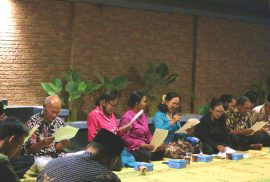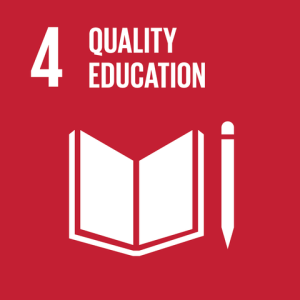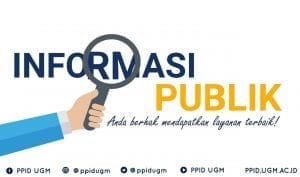Macapatan Friday Legen, Reciting and Learning about Serat Panitisastra
College StudentNewsSDGSStudentStudent's Activity Friday, 3 November 2023
Yogyakarta (11/03/2023) - The Javanese Language, Literature and Culture Study Program, Faculty of Cultural Sciences, Universitas Gadjah Mada (UGM), held Macapatan Jumat Legen on Thursday night (/11/02/2023) at the Center for Javanese Studies (Pusat Kajian Jawa or PUSAKA JAWA), Jl. Bungur No. F9, Perum UGM complex, Caturtunggal, Depok, Sleman.
This event in collaboration with PUSAKA JAWA UGM raised a work of Javanese literature created during the time of Sri Susuhan Pakubuwana VII and composed by Yasadipura II, namely Serat Panitisastra. Serat Panitisastra contains piwulang about guidelines regarding wise ethics and good morals that can be applied in everyday life. The recited Serat Panitisastra is the result of a script translation done by Alexander Sudewa. The literary work contains 10 pupuh including:
- Dhandhanggula 10 stanzas,
- Sinom 16 stanzas,
- Gambuh 13 stanzas,
- Pocung 19 stanzas,
- Dandanggula 14 stanzas,
- Kinanthi 20 stanzas,
- Asmaradana 18 stanzas,
- Sinom 15 stanzas,
- Jurudemung 9 stanzas
- Dhandhanggula 19 stanzas.
Macapatan Jumat Legen presented R. Putra Sukaca (Class of 2020) as MC or Announcer, Rudy Wiratama, S.I.P., M.A. as a speaker, and performers from Gamelan Mahasiswa Sastra Nusantara (GAMASUTRA). The participants consisted of students, lecturers, and from the Yogyakarta Language Center (Balai Bahasa Yogyakarta) and the Friday Legen Old Literature Correction Community (Komunitas Pemasyarakatan Sastra Lama Jumat Legen). The participants were very enthusiastic in participating in the Macapatan Jumat Legen activity, marked by the activeness of the participants in getting their turn to read and ask questions. The performance of GAMASUTRA in developing Serat Panitisastra gave the impression of this beautiful and noble Javanese Culture.
The purpose of holding Macapatan Jumat Legen is to preserve the Javanese song tradition, as well as introduce the tradition to the younger generation today. In addition, it is hoped that the moral message contained in Serat Panitisastra can be understood and practiced in life. Thus, these goals are in line with one of the missions of the Sustainable Development Goals (SDG'S), which is to improve and develop the quality of education.





